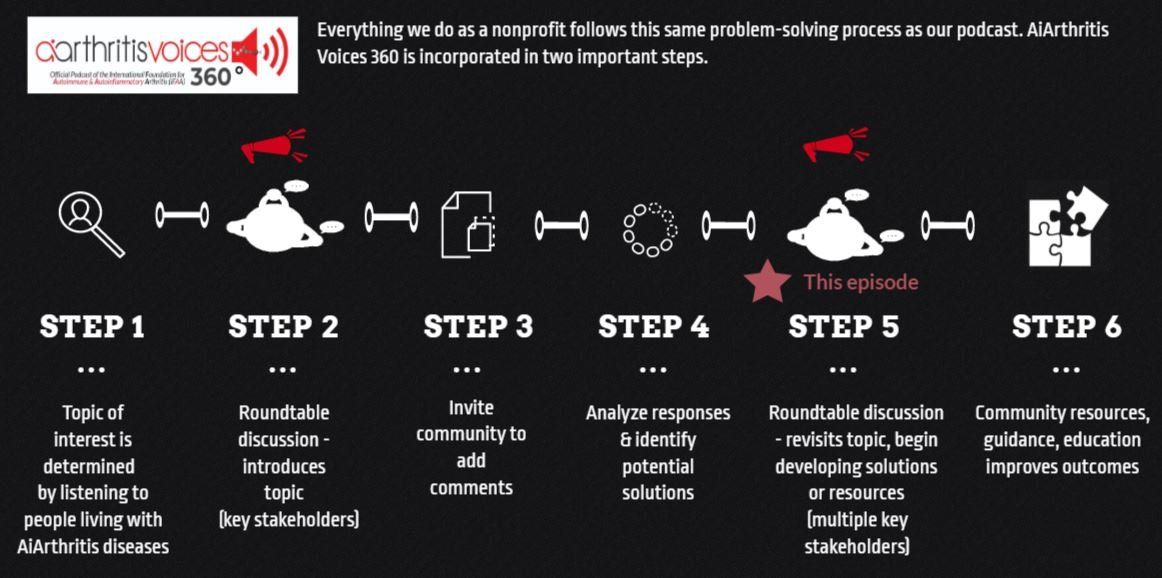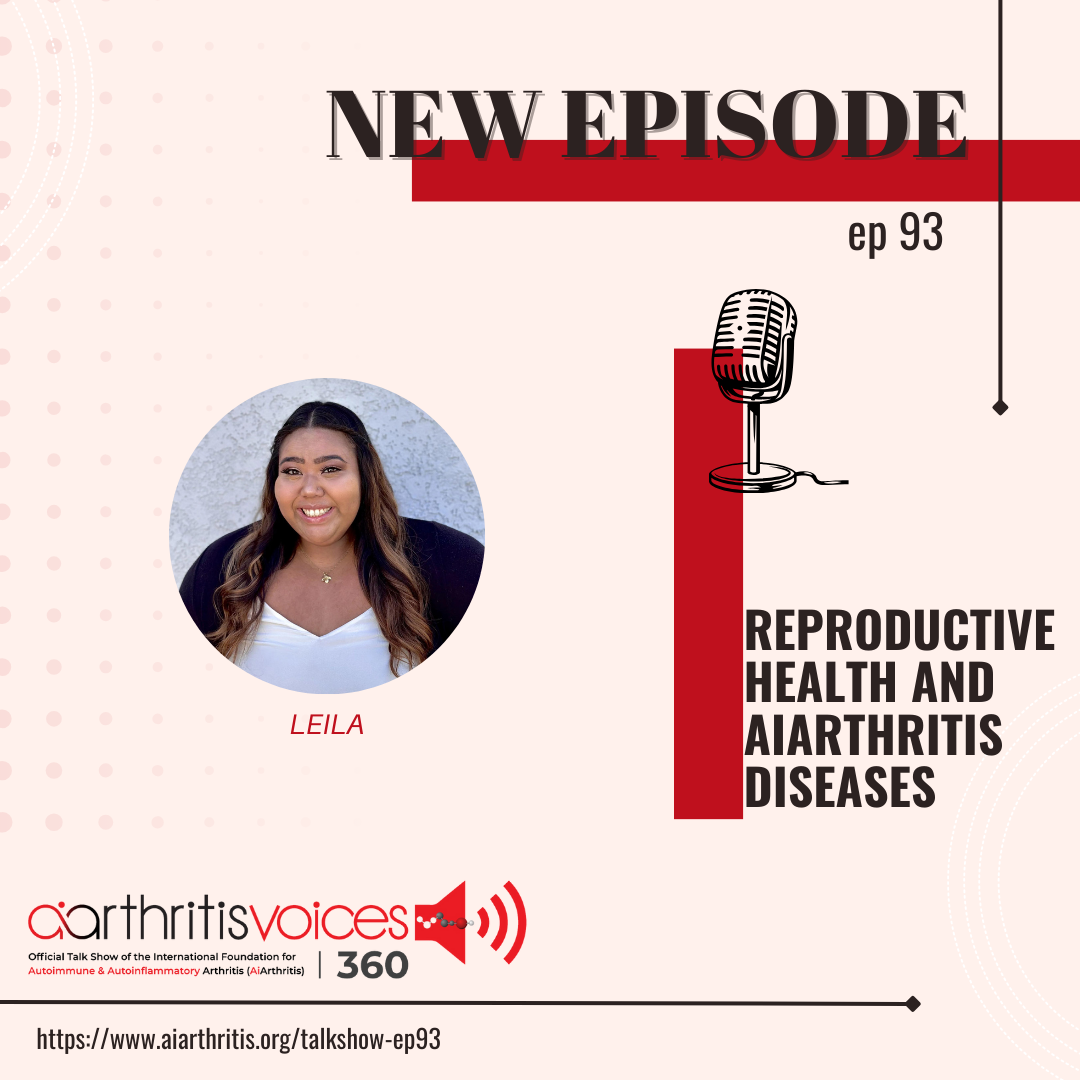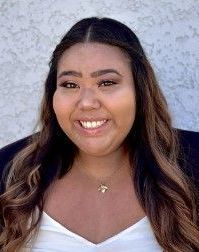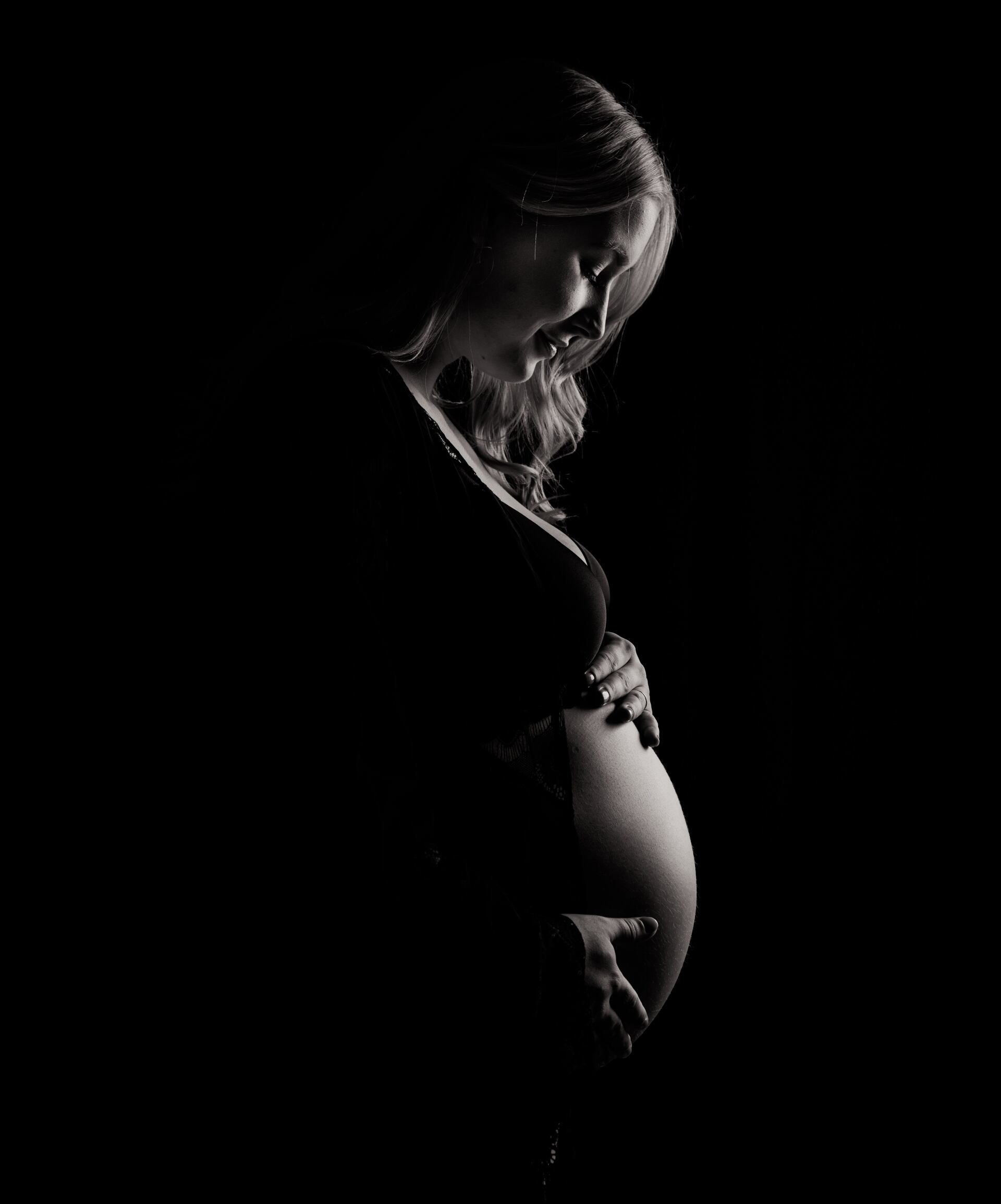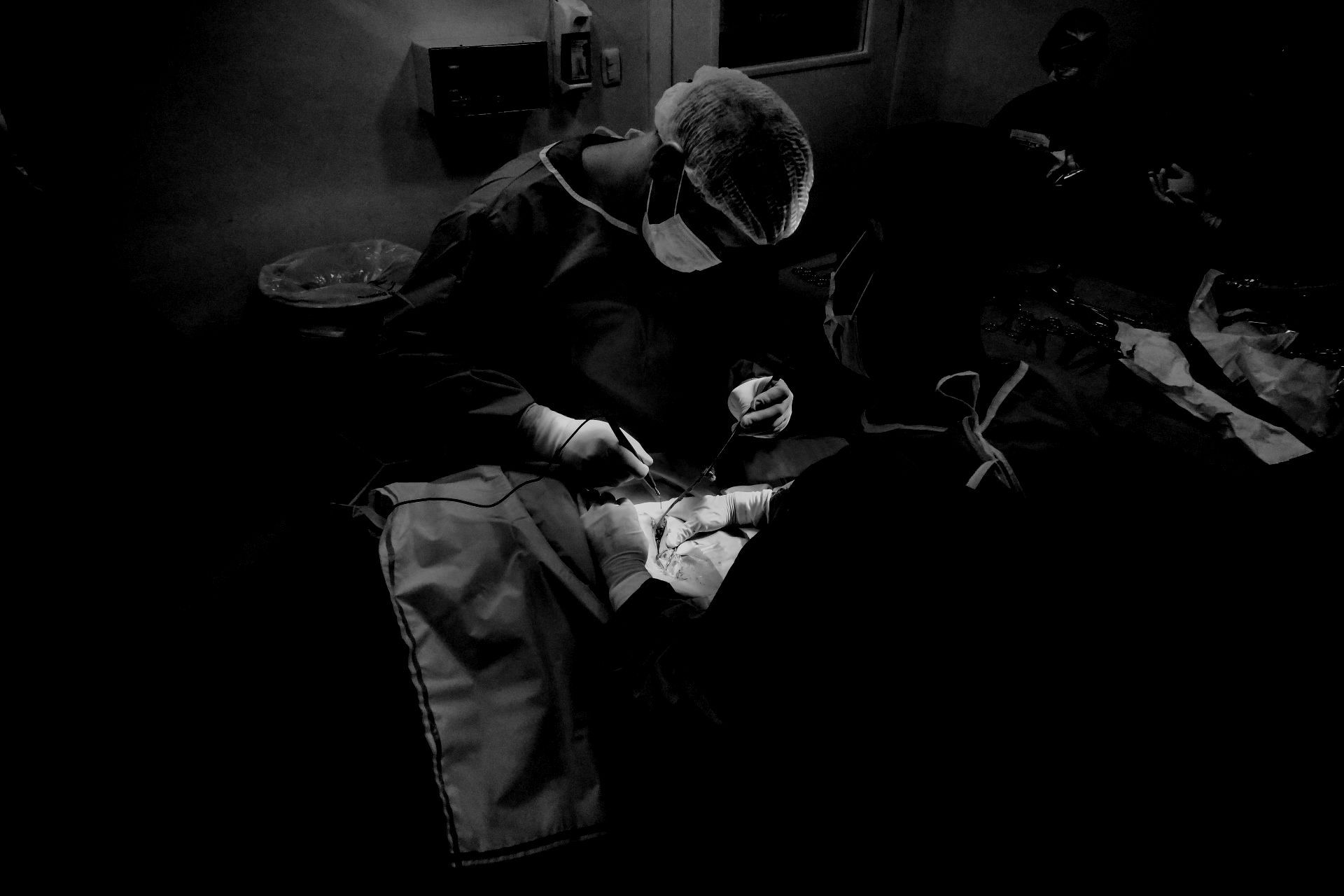[00:00:00] @Intro: Welcome to AiArthritis Voices 360, the podcast solving today's most pressing issues in the AiArthritis community. We invite you all to the table where together we face the daily challenges of autoimmune and auto inflammatory arthritis. Join our fellow patient co hosts as they lead discussions in the patient community, as well as consult with stakeholders worldwide to solve the problems that matter most.
Whether you are a loved one, a professional working in the field, or a person diagnosed with an AiArthritis disease. disease. This podcast is for you. So pull up a chair and take a seat at the table.
[00:00:45] @Leila: Hey everybody and welcome to AiArthritis voices 360. This is the official talk show for the International Foundation for Autoimmune and Autoinflammatory Arthritis or AiArthritis for short.
My name is Leila Lagandaon and I am the health education manager here at AiArthritis and a person living with lupus and Sjogren's disease. As I'm recording this, it is December 22nd, or a few days before Christmas, and when you are hearing this, it's going to be a few days after New Year's, so I wanted to say Happy New Year to you from the AiArthritis family.
We wish you and your loved ones the best 2024 possible, and I am excited to talk to you about the topic that I am coming to you with today. It's a topic that I am super passionate about before being in the autoimmune, auto inflammatory space, when I was first becoming a health educator, I thought my emphasis that I wanted to stick with was sex education or reproductive health in general.
So this is a subject that's near and dear to my heart. Of course, I love being in the autoimmune and auto inflammatory space so being able to cross over and talk about this too is amazing. And I am going to be talking to you about the research, the summary of the research that was presented at the Rheumatology Nurses Society Annual Conference in Austin in August of 2023 and also the American College of Rheumatology Convergence in San Diego in November of 2023. So the facts that I'm going to be giving you are coming from a couple of these sessions that I went to. And I hope that this information is helpful for you. On top of that, I am going to also be talking about my own personal experience with reproductive health and my family planning journey as well.
And so, as you can tell, I'm the only one here today. I don't have any co hosts. I hope that you do enjoy the talk show nonetheless and that it's very educational and informative for you all. But if you do have experiences of your own that you want to share with us that could possibly be a talk show in the future, social media posts, or any type of resource that we may develop very soon, I would really encourage you and love for you to give any comments or tell your own personal story.
Let me know, hit me up and send me an email at Leila@AiArthritis.org and I would love to discuss with you how we can take your story and use it and give some very valuable information to the rest of our AiArthritis community. So, I'll remind you again at the end of the episode, but feel free to email me at Leila@AiArthritis.org if you are interested in this topic, want to learn more, have any questions, or want to share your own personal story with something about your own reproductive health having to do with an AiArthritis disease. Specifically, if you have any of the more rare AiArthritis diseases, I'd love to hear any stories from that sector of our community.
We do hear a lot about lupus, rheumatoid arthritis, psoriatic arthritis, AXPAL, and all of those major main diseases that we do have, but I would love to hear more from the other side of the community too if there's anybody else that has any stories or insight about reproductive health. Alrighty, well, let's get into it.
I'm going to be talking first about reproductive health in general. I wanted to make sure that I do talk a little bit about men and or males in this situation with AiArthritis diseases because they can affect their reproductive health, too. So I'll talk a little bit about that and if there's any more insight that you all have again, please let me know but the first thing will be puberty can be delayed with an AiArthritis disease and this can be due to steroid use or disease activity, but it can affect bone growth and height and, you know, starting puberty later in life.
So that's something that does happen with AiArthritis diseases. And some females can get increased disease activity with menstrual periods. So there has been a lot of studies checking with the levels of hormones during menstrual periods and seeing the correlation between that and with that and the flares that come with menstrual periods and so that is something to also be aware of.
I'm sure everybody knows this, but unplanned pregnancy can cause severe health complications for both baby and mom. So making sure that precautions are being taken in order to make sure that that doesn't happen and cause, you know, all those complications. One of the things that can be used is birth control.
Birth control is a good tool, one, for helping those who may have severe menstrual periods and have a lot of trouble getting through the day when they have their menstrual periods. It can help decrease the amount of pain and suffering that someone might go through during their period, but therefore also can help with decreasing the chance of flares during that period too.
And so not all birth controls are created equal. Not all birth controls are recommended for those with AiArthritis diseases. Of course, like with any advice that we are sharing or any research that we are sharing, this is not an end all be all. Make sure that you have a conversation with your rheumatologist, your gynecologist, your family practice doctor to see what's best for you.
The research does say though that the safest forms of birth control are IUD or implant or the mini pill and that is because estrogen is not recommended for high risk patients because of the risk of blood clots. So the other forms of birth control are mainly estrogen based. So that's a big thing to keep in mind.
The IUD is something that can be a long term birth control option. It's a implanted device. It's actually called an interuterine device, that's what IUD stands for. It's a little T shaped little doohickey that's about this big, this big that is inserted into your uterus. in order to block an embryo from being implanted.
Or also if there's a copper version and a, and a hormone version, a plastic version. So the hormone plastic version also secretes hormones that can help to thicken your uterine lining to prevent pregnancy. And the copper version, copper is a spermicide, so it kills sperm that come in contact with it and also both can, you know, prevent the implantation of the embryo inside the uterus.
The birth control implant is a rod about this big that, and it's a very thin, it's maybe about this thin, that goes into your arm. I don't know if I can even, I don't know if I'd be able to show this to you on screen, but this is where my implant is. It's about this big so you can kind of see where I'm showing it and it's very thin.
This is my third or fourth one of them, but so that's the implant. The implant is put in as if it was just like a shot. So it's kind of like the put a device on you and kind of shoot in the little implant. And this is like the spot where it usually goes is like on the inside of the arm or on the bottom of the arm so that it's, it's kind of not in the way and not detectable. It also may even stop people from having periods. So it really just depends on each personal situation, but that can also happen. And that's what happened to me for most of the time is that I did not have a period for most of the time that I've been on it.
And the last version that is recommended is the mini pill, which is kind of a lower dose, regular pill of birth control, but estrogen is not included. So it's just the progesterone and estrogen is again, not recommended for those that are high risk patients. So that's something to keep in mind. Every situation is different.
Those with lower disease activity can have a bigger choice pool of what kind of birth control that they prefer. This also has to do with med compliance and how the patient is with taking pills and making sure to remember to take those pills. That's why I got the implant is because I did not want to have to remember to take a pill at the same time every single day, additional to all of the other lupus medications that I have to take.
So that was kind of my reasoning, but every single person has their own preference. All of the different types of birth controls. There is a really great chart on lupuspregnancy.org, which was mentioned in our previous episodes also that you can go check out on their website and see all the other recommendations that they have.
It's a really great resource. As I'm talking about the previous episodes, I think I ever met, I forgot to mention them. So I wanted to make sure that, you know, we do have two other episodes that are about reproductive health. We have episode 11, which is called Oh Mama Pregnancy Planning with a Chronic Illness and episode 51, which is Oh Mama Physical and Emotional Support Postpartum.
So that one is a little bit more about. breastfeeding and all of the other things that might happen after giving birth and how those around you can support you if you are a new mom with AiArthritis diseases. So please check out those episodes that have amazing guests from mother to baby, another resource that I will mention a little later.
And from mama's Forward, which is Mariah Leach, who is on both of those episodes. She is a really big advocate in our community for reproductive health and helping moms through the journey of becoming a mom. So check out those previous episodes. And I wanted to make sure that I did it, you know, kind of cover the same thing.
So that's why I'm talking to you about those episodes. So if there's anything that you might be wondering more about, about reproductive health may be in those episodes. So definitely please go check those out after this. Okay, on to the next section that I wanted to talk about is about fertility and medication and how medication can affect fertility and things like that.
So as we spoke before, there are medications that also can not be safe for babies when the mother is pregnant. So a lot of mothers may think that you need to stop all of your medications in order to have a healthy pregnancy for that baby, and that is just untrue. There are medications that you can be on to help control your disease that will not affect the baby or pass the barrier and be passed on to the baby and affect them. So again, that is a really big conversation to have with your own rheumatologist and gynecologist and having a collaborative team.
There are specific doctors, gynecologists that are for more high risk patients. So having a team of a high risk gynecologist and your personal rheumatologist that knows your story is really important to, you know, continuing that on.
I did mention again, those that's talked a little bit more about, you know, the medications to be safe, the medications to look for, and all of that kind of stuff is more in the previous episodes and on mother to baby. So make sure if you want to look specifically for your AiArthritis disease and the medications that are commonly used for that disease and check it out and see which medications are deemed to be safe and which medications are deemed to be not safe and which medications are kind of in the middle of being studied. So yeah, make sure to check those resources out. Okay, so I wanted to talk about medications that can affect fertility. So with the medications having to do with fertility, there's one medication in particular that I saw over and over again that was deemed to really affect fertility, in AiArthritis patients is cyclophosphamide, you know, really depending on the dose, there's like a threshold of how high the dose would be in order to really cause infertility.
And that can also depend on age. So if somebody is on cyclophosphamide and is needed to help control their disease, it's recommended that you preserve your sperm or egg. You would first have to go, you know, maybe a few weeks or whatever it might take without the medication in order to have safe eggs and sperm to freeze, but that is something that is recommended and then once, you know, you freeze the sperm or the egg and go back on that medication for the time being until, if you're a woman, if you have to get pregnant for males, you don't really have to worry about it anymore because the sperm is frozen.
So that's a good thing. Another set of medications that were studied were NSAIDs are those pain medications that we might be taking like naproxen, ibuprofen, and all of those different types of pain medication. There's actually no significant data to state that ovulation and implantation is inhibited by NSAIDs.
But there are certain situations where they have, so it's not significant data enough to say that for sure they do inhibit and to tell people to get off of it if you're trying to get pregnant, but again, a conversation to have with your, your team of doctors in order to see what may be best for you.
Another category that I wanted to talk about is ART or assisted reproductive technology. We talked a little bit before when we were talking about freezing sperm or eggs, but there are all other options to be able to assist with getting pregnant and with conceiving. So a few of those different ARTs are meds to help females ovulate.
There's IUI or Interuterine implantation or IVF, which is in vitro fertilization. So this is definitely recommended to do when your disease is well controlled. So that is the first step, is making sure that you can do all that you can to make sure that your disease is in the best state possible. Another thing to check for before doing any of these procedures would be to check for antiphospholipid antibodies, which can increase the risk of miscarriage.
So, just being, making sure to do those precautions before doing these procedures because as you may not know, it is extremely expensive to have some of these procedures done. So making sure that you plan and do all of these things to help the best success is, is really important to make sure that there isn't any money wasted or there isn't any time wasted and things like that.
Another thing to note is that AiArthritis diseases can often cause longer times to get pregnant, so for the average person, usually after 12 months of trying of actively trying to be pregnant and with, with no success is considered the first step of infertility. And in AiArthritis diseases, it tends to take a bit longer.
So maybe 18 months would be kind of considered the time where you start to get worried. But just knowing that with our diseases, it does take longer time to get pregnant. The next thing to note is that embryo banking is actually the highest likelihood of success. So if there is someone that you know that you already want to have a baby with, whether you're a female or a male, you can connect with that person and see if there can be an embryo banking instead of just sperm or egg banking.
So, they have the highest likelihood of success because there is no having to, you know, get them to be put together afterwards, after they were frozen. So that is something that is to look out for too. And as I stated before, it can be very, very expensive to have these done, but many employers are beginning to offer benefits to partially cover this.
I've heard some stories about, you know, someone working 20 hours at Starbucks a week for a few months in order just to get these benefits for fertility. There are a lot of different companies that do offer it to their employees. So seeing what you can do to get that for you, or if you already have those and insurance coverage is on a state by state basis.
There's only about 15 to 17 states that do require some kind of insurance coverage for these types of procedures. Alrighty, so that was that portion of kind of giving you some updates on the different points that were given at these conferences in order to do or do the best that you can with this information to have the most successful family planning journey. And even if that means family planning mean for you means not having children and making sure to be on birth control or using condoms, all of those different things, it's all in the same, all reproductive health and all important to make sure that you are making the best choices for your own self.
So, again, if you have any questions, let me know, Leila@AiArthritis.org. I'd love to have a conversation with you. I wanted to go in and talk a little bit more about my own journey and transition to that. So I am actually getting married in January so you can see my little engagement ring here. So I am getting married later this month in January.
And, of course, that all, that talk is all coming with the expectation of, oh, when are you going to get pregnant? So I have been on a journey for a long time to make sure that my body is in the best shape to get pregnant and have the most successful pregnancy possible. So, I mentioned before that I have been on birth control ever since I was I think 16 years old.
I've been on the implant. Before the implant, I was on Deporovera for a little bit and it made me gain a lot of weight, so they had me switch to the implant instead, and I have been on the implant ever since, and I have had basically no periods for maybe about a 10 year span and it has been very successful for me.
I have had, I have had no pregnancy scares. I've also been in a long term relationship with my fiancee for almost 12 years. So we basically, you know, made good use of the birth control and have, you know, made sure that it does work. And it also has, you know, really helped us with making sure that there's going to be no extra flares or no any extra symptoms that can be caused by, you know, a possible unplanned pregnancy.
So that is something that I have been super big on in even my friends who don't have AiArthritis diseases, but being a really big advocate for birth control and just making sure that all my friends and all of my loved ones are protecting themselves no matter what, whether it be from STIs or from pregnancy.
So I, next thing that I did to get ready for family planning is I have planned to, I, I for years have had plans to have the gastric sleeve surgery or weight loss surgery in general, or bariatric surgery. There is another previous episode that I do talk more about my bariatric surgery that I had in June.
If you want to check that episode out, we will have a link to that too. So you can hear a little bit more about my journey with that. But my biggest motivation for having the surgery was to be able to lose weight to be able to be there for my kids just in general, but then also to have the most successful and the most healthy pregnancy possible with my lupus.
And all of this is kind of full circle because I have been on and off prednisone since I was eight years old and I have been overweight since I was about eight years old. So the prednisone, the on and off prednisone spurts have caused me to gain a lot of that weight. I was, you know, with a lot of trying, even not able to lose that weight on my own.
And the most recent flare that I had in 2021 with my lupus nephritis, I was on prednisone, 60 milligrams of prednisone for about four or five months. And that had me gain about another 40 pounds. And I knew once I was done with that set of prednisone that I needed to do something about my weight. I was before I had the surgery earlier this year or in the beginning of 2023, I was 374 pounds, or 378 pounds is where I started in January of this year. That's really big and definitely not a healthy weight to be able to carry a baby, and I have known my whole life that I wanted to be a mother, so I knew that I needed to take steps in order to make that happen and be successful and healthy. And so I had the surgery in June this year with knowing that we are also getting married in January. I so far have lost about 75 pounds, so I'm down to under 300 now which has been great. Oh, I guess I've lost more than 75 five pounds then, but I, I am under 300 now and I'm feeling healthier than ever, have been able to move more, do a lot more, have a lot more energy and focus a lot on my health.
So this is all in preparation for hopefully being able to conceive a baby in the next year or two. And so the next step after this is to take out my birth control. I started having the conversation with my rheumatologist earlier this year, I'd say maybe like in February or March, when I saw her, I let her know about the bariatric surgery.
I let her know that the next step after bariatric surgery is taking out the birth control and looking to conceive. One of the biggest things about the surgery that has been helpful in this family planning journey is getting off a lot of my medications that I was on. A lot of my high blood pressure medications and also my kidney medications that I was taking for my lupus nephritis, mycophenolate. So mycophenolate is absolutely not baby safe. So that was something that we needed to find an alternative for that was baby safe. But now since I have lost the weight and my kidneys have been doing very well, I've actually been able to get off of mycophenolate completely.
So now there's that barrier that is decreased and same thing with some of my blood pressure medications that we were concerned about. Those are gone and I am still on blood pressure medication, but they are all baby safe as of right now. So that is really exciting to know that now this family planning journey may be a little bit easier.
The biggest thing that is up for contention right now is my biologic, Benlysta. Mother to baby is currently doing studies on Benlysta to try and prove that it is safe during pregnancy. My rheumatologist told me that there have been, she has had patients that have decided to not take it at all. She has had patients that have decided to not take it at the beginning of the third trimester because it's said that the third trimester, or it's known that the third trimester is when the baby's autoimmune system develops, so just basically not wanting to suppress the baby's autoimmune system when it's just being created and having them be more vulnerable to infections and other diseases once coming out of the womb. So that's something to that we can kind of stay tuned for. My plan right now is to stay on the Benlysta, at least for the two trimesters. I'm kind of trying to like, stick out in the background and see if there's gonna be any more data or any more personal accounts of people staying on it the whole time. Because I have been on Benlysta since 2014, so almost 10 years now, and it has significantly changed my quality of life.
When I am not on Benlysta, like when I first got diagnosed with my lupus nephritis in 2019, back then Benlysta was not indicated for lupus nephritis. And so once I was diagnosed with lupus nephritis, they had me switch to Rituximab again. And Rituximab, it's it helped with my inflammation markers, but it did not help with my fatigue, my muscle pain, my joint pain like Benlysta did.
And, you know, this was during the time of the pandemic, so it was, it wasn't as noticeable to see like my, my fatigue be increased and my joint pain and things be increased because I was just at home all the time. But once kind of things started to open up and I had to go back to work. physically in the office and all these things, I could tell that I was very, very tired and just not doing the best.
So I had to ask my rheumatologist to see if we could get on Benlysta. And by then, maybe about six to eight months after I tried Rituximab for the first time, Benlysta had been indicated for lupus nephritis. So ever since then, I have been consistently on Benlysta again, and I really, at all costs, do not want to get off of it, if at all possible.
So we will see how that goes. I am signed up for MotherToBaby to keep track of me and my potential pregnancy. So once I do get pregnant, I will let them know, and they will start tracking me and seeing, you know, asking questions, getting all the data for me to be a part of their studies on Benlysta. So that is where I am right now in my family planning journey.
My goal is to hopefully lose another 50 to 100 pounds before taking out my birth control. So my goal is to somewhere between June and December of 2024, take out my birth control for us to actively start trying to have the baby. But at this point, it's all up for grabs to kind of see how my weight loss journey goes and how much weight I can lose in that time because I want to take advantage of the surgery as much as possible because a lot of people, once they do have a baby, it doesn't reverse the surgery because the surgery is cutting off a part of your stomach, but you know, you can gain weight back because of the baby and you can need revisions in the future.
So I want to make sure that I'm giving myself enough time to get enough weight off. They usually say about a year, a year and a half is good. And when you start to get stable again, after that, so, June of this year is when I had this rotary. So June of next year is when I possibly would start to look at taking out the birth control, depending on how much weight I have lost so far. I'm trying to think if there's anything else I want to share about my family planning journey. Oh, maybe I can talk a little bit about like the, the implications of all of this in my relationship and, and how it could have possibly affected it.
Because I think that's something that a lot of people don't talk about is, you know, for the other people on the other side who don't have an AiArthritis disease, it can seem very complicated and there may be people that don't want to deal with it. There's been lots of conversations with my fiancé about this because I know for sure that he wants to have kids and kids that are his own.
So, It's been a really big priority for me because I want the same for us to do everything that we can to plan for it to be successful. So, um, he's been very supportive with everything that I'm planning on doing because he knows that it's for the better of our future kids, for us, for our future life.
But it has been, you know, a while since he's wanted to get married and have kids and I just haven't been ready or been able to kind of, get myself ready for the surgery to therefore then be comfortable starting to plan to have a baby. So I have delayed this a little bit than, you know, what we originally intended just to get my body completely ready.
We were planning on possibly getting married back in 2021, 2022. And now we are getting married in 2024 to kind of to compensate for the pushback schedule with everything having to do with family planning. So I think that it's, it can be a very hard conversation. Hopefully if you are in the mind space of planning or starting to have family planning that you've had these conversations with your significant other about what that might look like.
I think another thing to focus on, which was also mentioned in the other episodes is the, you know, what is going to be needed after the baby is born also, because me and my fiance, we live away from our family. We're originally from San Francisco Bay area in California, but we live more in Los Angeles.
So about a six hour, seven hour drive away, I went to college in Southern California. So we've stayed there ever since I was in college, but with knowing with my lupus and that it will be a high risk pregnancy, there are possibilities that, you know, the last three months of my pregnancy, I'm going to be on bed rest and the months after having the baby is going to be very tough.
So being near family is something that would be a priority for us, but that would require a whole move to the other side of the state again, so that's also kind of the other part that we're trying to figure out with me having lupus and Sjogren's is we, you know, a lot of people can do it by themselves on their own with some help, with some friends and family, if you do have two able bodied parents, but for us, I feel like It will require for us to have a little bit more help, whether that be friends or family, or a babysitter, or a nanny, or whatever it might be.
But just knowing that we should prepare for that is something also that is taken into consideration. So, with the timeline of the wedding, and with my surgery, and losing enough weight, and taking out the birth control, and moving if we have to move, it's a lot of moving parts. Funny, a lot of moving parts.
So just keeping all those schedules in mind and trying to make the best decisions is pretty tough. And it requires a lot of open communication, hard conversations, and things like that with significant others with loved ones. And so those are my insights on what is all required with having to family plan with an AiArthritis disease.
And I hope that sharing my story with you may help you in any way knowing that you're not alone in this journey, it is tough and sometimes can be lonely. Thinking, man, like this is just so easy. You know, there's other people that can just get pregnant right away if they want to and things like that.
But trying to stay out of that headspace and just working with what you have, you know, being happy that you still can have a successful pregnancy, that there is technology nowadays to be able to assist with that, there are a lot more research saying that you don't have to get off of all your medications because it was back in the day that people had to get off their medications and just suffer through their full pregnancy through the full nine months.
So. I am excited to see what the future holds, and I do plan on making future 360its of this episode to update you on my journey whenever there are updates, so you can look out for that I also, again, wanted to mention the two episodes that are related to this episode, episode 11 and episode 51, having to do with reproductive health.
Also, with Mariah Leach, her website and her social media platforms have so many different resources and support for those that are going through this journey as well. And so, checking all of those things out with lupuspregnancy.org and Mother2Baby is super important to make sure that we are informed to make the best decisions for ourself.
Continuing to be advocates for ourself and being the expert on our own bodies and being, you know, as as involved and as hands on as we can with our own health and taking our journey into our own hands. So, yeah, I think that that's it. Again, if you have any questions and or want to share your personal family planning journey with me, you can email me at leila@aiarthritis.org. You can also find me online on Instagram and TikTok at Lupus.Lifestyle.Lei L E I. And you can also follow AiArthritis on all social media platforms at IFAiArthritis. The I F stands for the International Foundation of AiArthritis. You can find us on TikTok, Instagram, X or Twitter, Facebook, with that handle, LinkedIn, wherever you want to follow us.
And, I wanted to, as I was driving, you know, I decided to use my chili red compression gloves from Grace and Abel. If you don't know, we have a collaboration with Grace and Abel who makes these amazing soft and comfortable compression gloves. You can see our little logo here. So part of the proceeds do go to us.
And this is a collaboration with recent able for World Arthritis Day, which was about a month or two ago. So if you are interested in getting a pair and helping to support AiArthritis, we would be so grateful if you were able to do that. There will also be a link here to those. And just overall in general, we really are, you know, funded by our donations and we are expanding our reach and our staff as much as possible in 2024.
So any donations that you can make would be really appreciated. If you want to see more of this talk show and more of our resources and more of these hard conversations. Please donate. There are two options on our website. You can go to AiArthritis.org/donate. We have a direct link where you can donate there.
You can also donate on Venmo if you have Venmo. Again, thank you so much for listening to the AiArthritis Voices 360 Talk Show. My name is Leila, the health education manager here and I just wanted to say thank you for listening and have a good day.
AiArthritis Voices 360 is produced by the International Foundation for Autoimmune and Autoinflammatory Arthritis. Find us on the web at www.AiArthritis.org. Also, be sure to subscribe to this podcast and stay up. Today on all the latest AiArthritis news and events.
